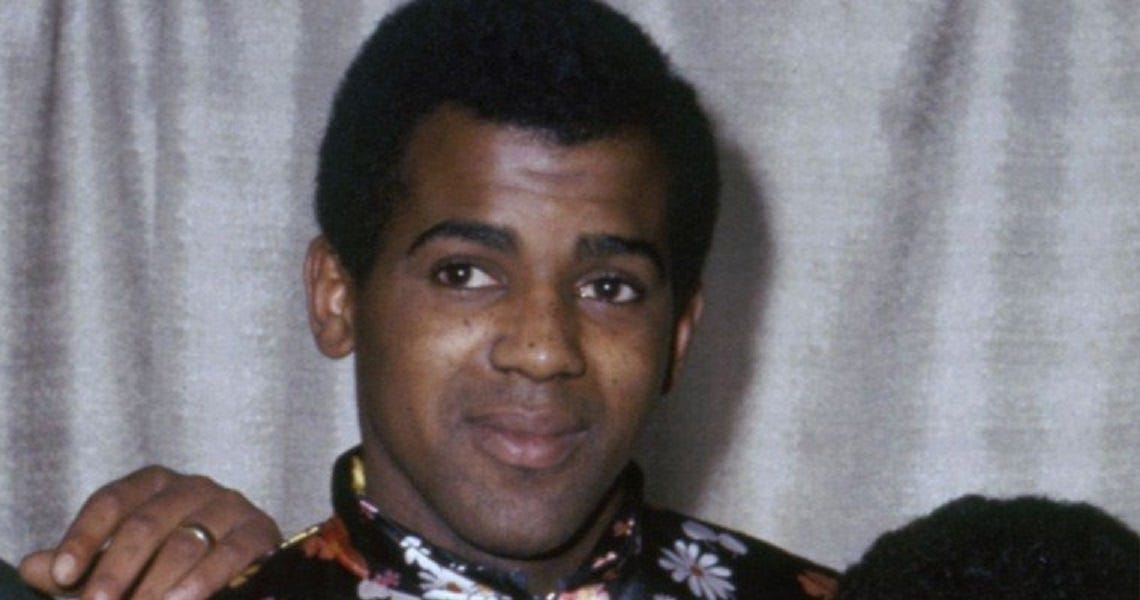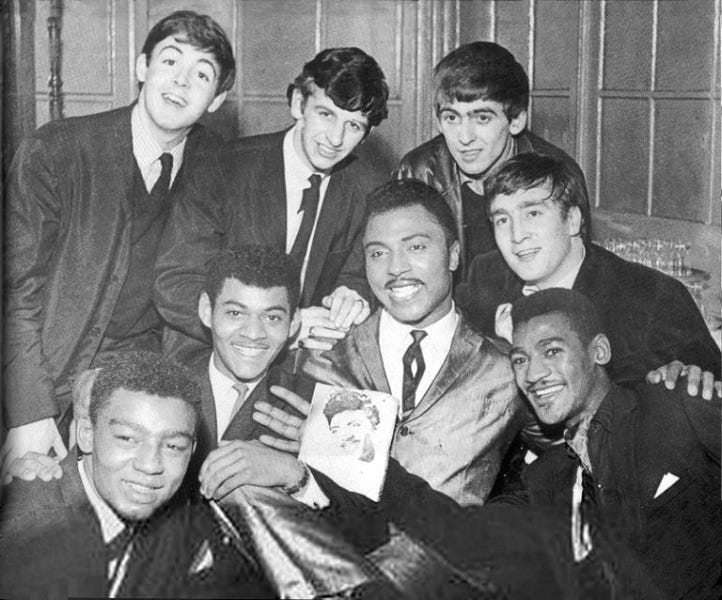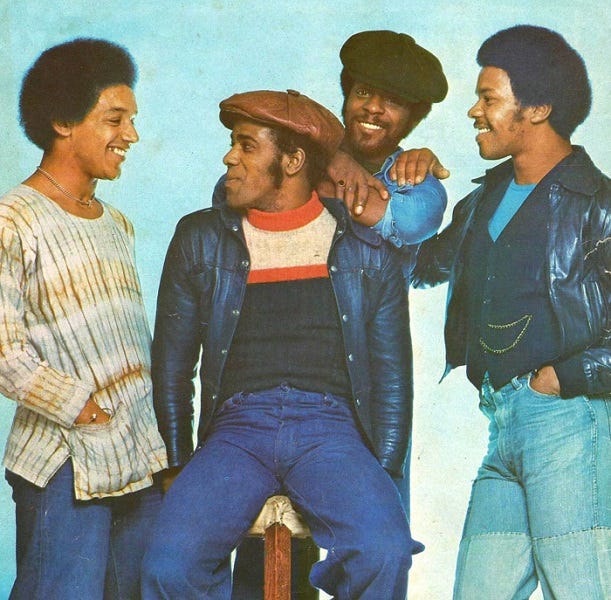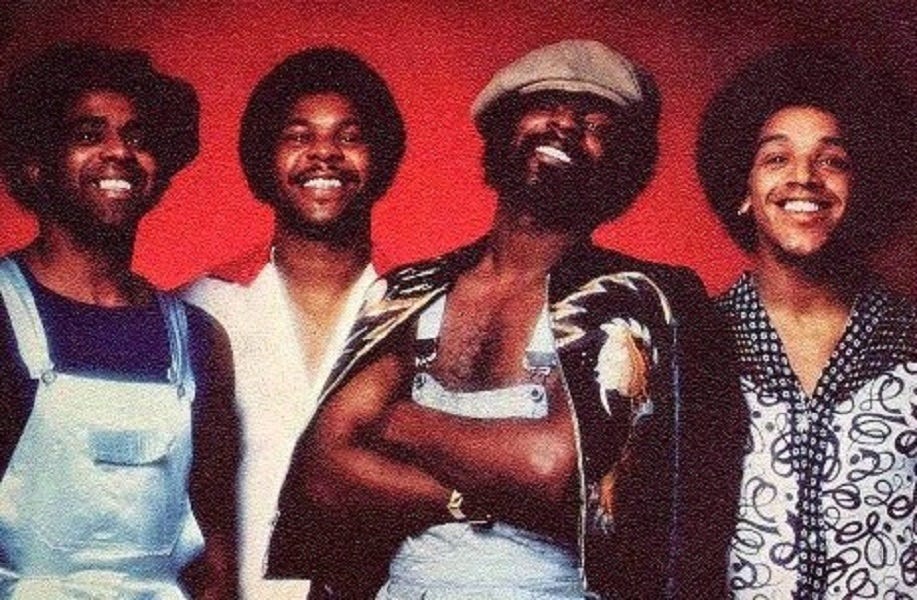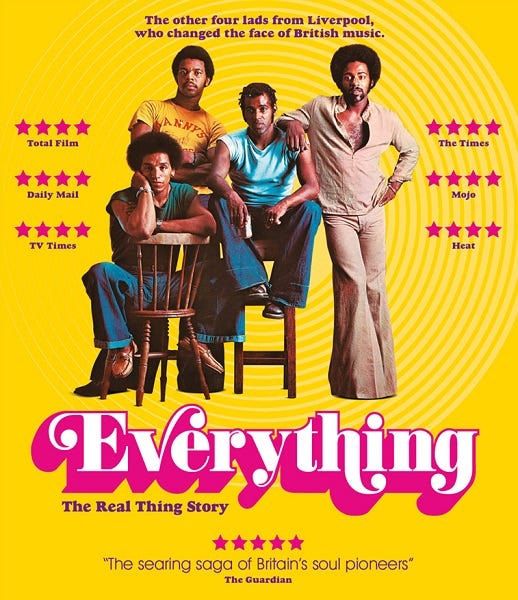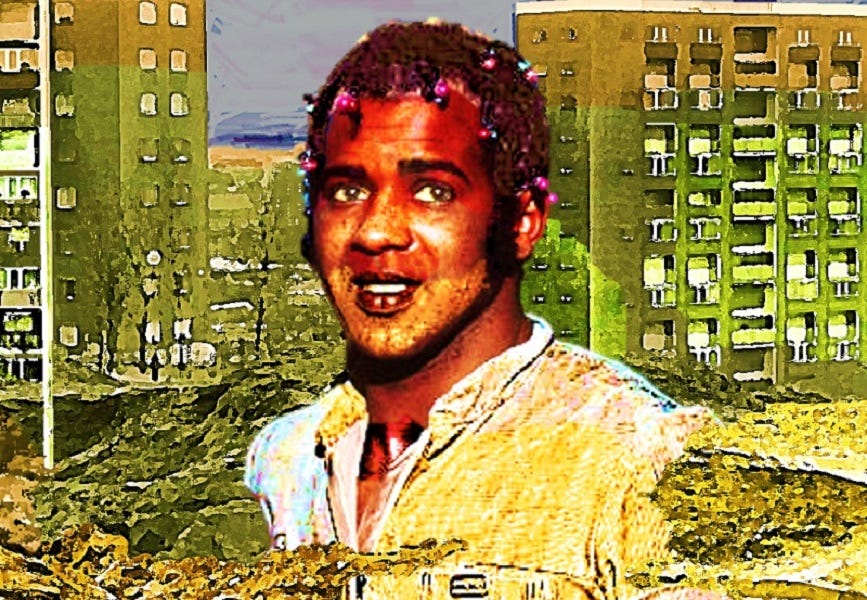Eddie Amoo (May 5, 1944 – February 23, 2018) – Love Is A Playground (1977)
The great singer/songwriter co-wrote many of the Real Thing's songs along with his brother Chris, like this superb non-LP B-side originally recorded by the Chants.
View most updated version of this post on Substack
Search our full archives
Eddie Amoo was a singer/songwriter and producer from Liverpool who founded the doo-wop group the Chants in the early 1970’s and a decade later joined his brother Chris Amoo in the Real Thing, who were the UK’s most commercially successful Black soul/funk group of the seventies.
Born and raised in Liverpool, Amoo founded the doo-wop group the Shades in 1962, who soon changed their name to the Chants. Before long, the Beatles heard about them, and invited them to come hang out and sing at the Cavern Club one afternoon. As Amoo recalled in a 2015 interview:
“They were so knocked out with us that they invited us to sing four songs with them that night. We were an acapella group and The Beatles introduced us half way through their show and it was fantastic. It was at that point that I thought to myself, this is what I want to do. So basically that is where it all began for me.”
The Chants were together as a group until 1975, but never saw chart success. Eddie’s younger brother Chris decided he wanted to form his own band, and in 1970 put together the Sophisticated Soul Brothers (SSB) with friends Dave Smith, Kenny Davis and Ray Lake, later known as Vocal Perfection.
After legendary promoter and former Decca A&R rep Tony Hall drove up from London to Liverpool to see them perform, he signed on as their manager on the condition they change their name again. Stopped at a light at Piccadilly Circus, he looked up and saw a billboard for Coca-Cola blinking out the slogan “It’s the Real Thing,” and the group’s new name was born.
Their first single “Vicious Circle” was a very funky socially conscious song written by Eddie Amoo and produced by Hall. It was initially released by Bell Records in the UK on January 14, 1972 with Parts 1 and 2 on each side, but did not chart. Two years later, the group re-recorded it with strings and horns added, arranged by Gerry Shury, again spread over Parts 1 and 2 on a single and issued on EMI.
The group’s second single “Plastic Man” (1973) was written by Eddie Amoo, and co-produced by Hall, Rik Dejohnette, and Steve Rowland, with Gerry Shury again arranging strings and horns, b/w the slow jam “Check it Out.”
It again failed to chart. The group went on to release five more non-charting singles during 1973-75, but didn’t give up. When the Chants dissolved in 1975, Chris invited Eddie to join the Real Thing, and he accepted. Hall introduced them to British pop star David Essex’s manager Jeff Wayne, who initially wanted the group to provide backing vocals for some TV commercials. They ended up becoming the backing band for Essex. It was a turning point in their career, bringing them the widespread attention they had previously lacked.
They switched from EMI to Essex’s label Pye Records, and eventually recorded the disco-flavored pop-soul “You to Me Are Everything,” co-written by Ken Gold and Michael Denne. It was released in April, 1976 and began climbing the UK charts, peaking at #1 for three weeks that summer. After they appeared on Top of the Pops to promote it, the single started selling 30,000 copies a day.
In the U.S., two other versions of the song were released almost simultaneously by the R&B groups Broadway and Revelation, which prevented any one version from becoming a hit. But the Real Thing’s original still hit #28 on the R&B charts.
In the single’s wake, they released their debut album Real Thing. Amoo explained in a 1996 interview:
“Our first album was all our songs, but all the songs had been written basically maybe five or six years before. And as soon as ‘You To Me’ took off, we went right into the studio and recorded them all.”
Their follow up “Can't Get By Without You” was another huge record in the UK, reaching #2 on the singles chart in the fall of 1976. It was only kept from the top spot by ABBA’s mega-hit “Dancing Queen.”
The third single off their debut LP was the slow jam “You'll Never Know What You're Missing,” issued on January 28, 1977. It peaked at #16 in the UK. The single’s non-LP B-side was the superb “Love Is A Playground,” which was co-written by Chris and Eddie Amoo who also co-produced it with Dennis Weinreich. It was originally recorded in a less polished version in 1974 by the Chants, and initially produced by Ian Green, who arranged the strings and brass on its re-recording.
While they were riding high with their two big hits, David Essex made a wise observation about what lay in store for them. According to Amoo in 2015:
“I will always remember when David took us to one side when we were at number one in the charts with “You to Me Are Everything.” He said that he was made up for our success but that he felt sorry for us because we would never get the chance now to come through with the amazing songs that we had written. We were all pretty naive and didn’t really understand what David was saying; we were just wildly excited at being number one in the charts. We had made it, we were stars, we had happened and all the rest of it. But reality is different as we very soon learned…We (thought) that if you had a hit people would accept anything that you did; they would listen to anything. However it is all about your type of audience.”
Having broken through with a pop-soul sound, the group’s funkier side remained a harder sell. They wanted to call their second album Liverpool 8, in tribute to the impoverished, racially mixed neighborhood they had grown up in, but Pye Records rejected that title and it was instead released as Four From Eight (1977). The LP did not chart at all, compared with Real Thing which had reached #34 on the UK album charts.
Its lead single topped out at #33, the upbeat love anthem “Love's Such a Wonderful Thing,” co-written and produced by the Amoo brothers, b/w the mellow slow jam “Topsy Turvy” which had been included on Real Thing. Their next single, the EWF-flavored “Lightning Strikes Again” peaked at #51. It was again co-written and produced by Chris and Eddie Amoo, b/w the superb non-LP disco-funk cut “Dance With Me,” produced by Lou Reizner who co-wrote it with S. Mark. “Dance With Me” was also included on the soundtrack to the 1977 film Black Joy.
The album’s epic “Liverpool 8 Medley” contained the laid back, socially conscious jam “Children of the Ghetto,” co-written by the Amoos, which became a club hit when it was later released as a B-side.
For their next album Step into Our World (1978), the Amoos co-wrote the disco-funk unity anthem “Can You Feel The Force?” about a brighter future to come. After it became another hit for them at #5 in the UK, the album was re-released in 1979 and re-titled Can You Feel The Force. The single was brilliantly remixed by pioneer disco DJ/remixer John Luongo, in both vocal and instrumental versions, and used as the title track on a 2XCD/LP compilation of his greatest dancefloor remixes, released in 2017.
The Real Thing had one more monster dancefloor jam up their sleeves, “Boogie Down (Get Funky Now),” co-written by the Amoos, which was the lead single from their 1980 LP ...Saints or Sinners? and hit #33 in the UK. It was again remixed by Luongo along with producer Jean-Philippe Iliesco.
In 2019, the year after Amoo’s death in Melbourne, Australia, the critically acclaimed documentary Everything was completed, a detailed look at the group’s history.
Rest in Peace, Eddie Amoo.
Further info:
“Eddie Amoo: Man Without a Face,” interview by Alwyn Turner, The Lion and Unicorn, 1996.
“Interview: Eddie Amoo,” by Kevin Cooper, UK Music Reviews, August 10, 2015.
“Eddie Amoo,” obituary, The Guardian, February 26, 2018.
“Eddie Amoo, singer songwriter with The Real Thing,” obituary, The Herald (Scotland), February 26, 2018.
“October 1962 – The Beatles back The Shades / The Chants,” Parts 1 & 2, by David Bedford, October, 2019.
#soul #funk #disco #TheRealThing #JohnLuongo #EddieAmoo




